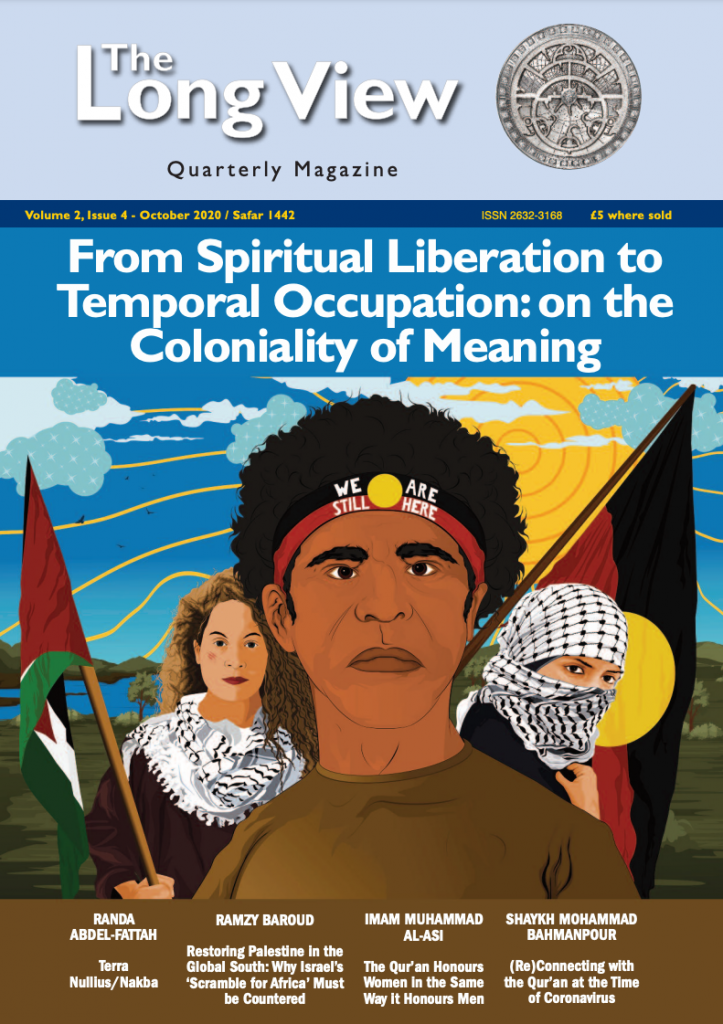From Spiritual Liberation to Temporal Occupation: on the Coloniality of Meaning
Volume 2 – Issue 4 – October 2020 / Safar 1442
Editorial
The recent Israeli war on Palestinians has highlighted once more – despite the best efforts of powerful countries and compliant media – the brutality of the Israeli project of occupation. As with previous such wars, the limelight soon fades as ceasefires are called, and the ongoing stifling of Palestinian life and aspirations, by routine physical and psychological violence remains invisible. The strategies – military and political – that mask this brutality and injustice feature in two of this issues’ articles. The tropes used to justify such violence are identified in the dissection of news media and political tropes and processes that create the ‘threat’ of the Muslim / terrorist other.
Our lead essay focuses on the turnaround of Israel’s fortunes and position in the Balkans, specifically in Albania and Kosovo. Olsi Jazexhi argues that the lobbying by the Israeli government and the cajoling of the US of Albania and Kosovo into striking vociferous pro-Israel alliances is a lesson for other Muslim majority countries. Such shifting of political cultures – from countries which had had pro-Palestinian governments, civil society and publics, to the current situation, was made with the help of well-worn Islamophobic tropes being adopted into official discourse and used to silence dissenting voices, particularly but not solely, amongst the religious Muslim population. Whilst much has been made of the recent ‘normalisation’ between certain Arab states and Israel, the lesser-known history of ‘normalisation’ in the Balkans is one that needs to be heeded and learned from. Alongside military partnerships, civil society finds itself often criminalised on the basis of Islamophobic tropes that recycle colonial motifs of the Muslim and Islam as violent, anti-Semitic and barbaric.
These tropes are also what has been internalised by mainstream media in its discussion – or in fact lack of discussion – of the almost daily violence inflicted by Israel on Lebanon. In our second essay in this issue, Denijal Jengic argues that the colonial project that is Israel relies upon the recycling and reproduction of such stereotypes, which serve to render invisible the military incursions perpetrated against Lebanon. Decolonising the region, he argues, relies on actors rejecting these tropes and resisting the representation of themselves and their aspirations. In this the fate of Lebanon and Palestine are intertwined, where liberation is not solely about physical sovereignty but also language and meaning.
Ian Almond highlights the pervasiveness of ‘threat’ in our culture, and specifically the ‘threat’ of terrorism that most of us in the Westernised world had become accustomed to on a daily basis for almost two decades. That is, until the beginning of the pandemic. Having fallen off the news agenda almost entirely, Almond argues that the Coronavirus crisis has exposed the news media as complicit in promoting an exaggerated image of the dangers society faces from ‘terrorism’. This exaggeration serves the interests of elites, whilst simultaneously providing salacious ongoing news content that panders to the needs of a 24-hour news cycle. He hopes that the hiatus is noticed by the average news consumer, and that this is the start of a more critical evaluation on the part of the general public of the processes of big media organisations and the political agendas they serve.
Our final essay looks at the bigger picture behind and ahead of the anti-terrorism regime in the UK. Taking an overview of 20 years of laws and policies, Massoud Shadjareh argues that in challenging each incoming piece of legislation or new policy, we have lost sight of the shift in social and political mores. Those norms now suppress political dissent across the spectrum and police the thoughts and aspirations of many more than just the Muslims, for whom such laws and programs were initially designed. From the appointment of Islamophobes to key positions to the ever widening scope for being branded an extremist, the political landscape in the UK has narrowed, with Muslims now just one of many groups excluded from having any political and sometimes even social agency. As this edition goes to print, news that a(nother) 11-year-old child has been referred to Prevent – by their teacher – based on his comment that he wanted to ‘give alms to the oppressed’ – highlights the level of thought policing that exists in this country. It also evidences how the malign shadow of Islamophobia hangs large over all social settings from which even children are not safe.
Shadjareh ends with a plea to Muslim civil society to end its internalisation of the narratives that have led it to capitulate in large part to the Prevent agenda, and team up with other affected groups and like-minded activists to challenge what has been happening. As all our contributors argue, it is time to see and to make seen the injustices that have been hidden in plain sight. Help us to do so by joining this conversation.


